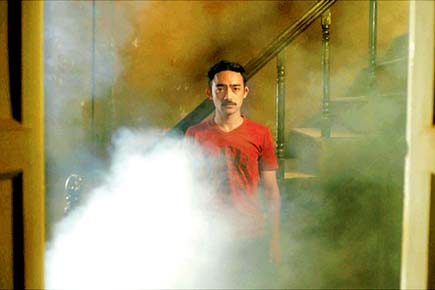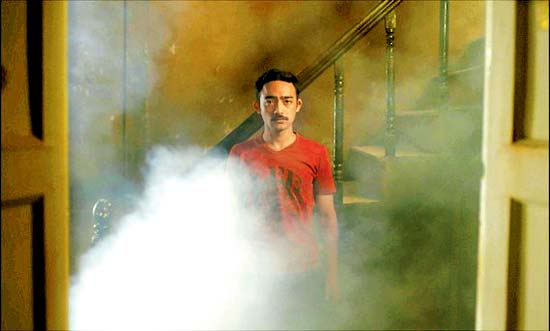A little student film about love and longing in the afternoon is holding up India's ijjat at Cannes this year


Payal Kapadia's Afternoon Clouds, which is showing at Cannes
ADVERTISEMENT
 A little student film about love and longing in the afternoon is holding up India's ijjat at Cannes this year. Payal Kapadia's Dopahar ke Badal (Afternoon Clouds), a 13-minute short, is the only Indian film to be officially selected at Cannes. It will play in the Cinefondation section for film school entries, in this case, from the Film and Television Institute of India (FTII).
A little student film about love and longing in the afternoon is holding up India's ijjat at Cannes this year. Payal Kapadia's Dopahar ke Badal (Afternoon Clouds), a 13-minute short, is the only Indian film to be officially selected at Cannes. It will play in the Cinefondation section for film school entries, in this case, from the Film and Television Institute of India (FTII).
Dopahar ke Badal is a pensive film that is strong and delicate at the same time. It is about a lonely, middle-aged woman and her Nepali maid Malti, so the film is in Hindi and Nepali. One day, as the maid takes an afternoon nap, she has a daydream that her friend, Sapan, visits her. He gives her a postcard with something romantic written on it in English, and there is a delicate moment when he awkwardly tries to explain what it means, as workers who have come in to fumigate the place, stare at him. Soon, Sapan is covered in the dense white clouds created by the fumigators and slowly 'erased'.
It is a very FTII film, if you know what I mean. You can clearly see the director's superior craftsmanship, with allusions to elliptical ideas. The film is suspended between desire, daydreams, memories, and the loneliness of single women. It is exquisite how the cloud from the maid's daydream enters her mistress' nightmare. And irony in the poetic cloud - a meghdoot of your lover's messages - being a machchar-maraoing repellent. The camera framing is precise in every location, and doesn't move throughout. The film is very still, with a lot of silences and a meticulous sound design, and the performances are good too. Kapadia's previous independent short, The Last Mango Before the Monsoon, won the FIPRESCI Prize and a Special Mention at the International Short Film Festival in Oberhausen and Best Short Fiction Film and Best Editor (short fiction) at Mumbai's MIFF. There is something precious about the deep roots of FTII's tradition that nurtures films like these, that are artistic, metaphorical, demanding, open to absorbing different cultures in India and outside, and not only constrained by commerce.
So, it is a real shame that Indians cannot easily see Indian films selected at festivals worldwide, including Cannes, which is why I had curated a Cannes in India Festival for the Alliance Francaise in 2011, that travelled to about 15 Indian cities. It showcased Indian films that had been selected at the Cannes film festival over the years. Of these, I focussed mainly on first films made in different languages, from all over the country. It had features, shorts, animation and student films, including Mira Nair's Salaam Bombay, Vikramaditya Motwane's Udaan, Rituparno Ghosh's Dosar, Murali Nair's Marana Simhasanam, Gitanjali Rao's Printed Rainbow, Anirban Datta's Tetris and more.
Rather than whine about how there is no Indian feature at Cannes, let us look forward to seeing in India, hopefully, the offerings of Michael Haneke, Fatih Akin, Sofia Coppola, Andrey Zvyagintsev, Bong Joon-Ho and others. Moreover, let us celebrate the debut features of our Asian neighbours at Cannes, including Sri Lankan filmmaker Jude Ratnam's documentary Demons in Paradise (Sri Lanka-France) and Iranian filmmaker Anahita Ghazvinizadeh's They, both in the official selection's Special Screenings, alongside Vanessa Redgrave's debut film, Sea Sorrow. In Demons in Paradise, a Sri Lankan Tamil boy, who had escaped an ethnic massacre by fleeing on a train in 1983, revisits his country 30 years later as a filmmaker, after the recently-ended civil war. Ghazvinizadeh's They is described as a "not-coming-of-age drama", featuring "J", who is diagnosed with Gender Identity Disorder, goes by the selected pronoun "they", and takes hormone blockers to suspend their puberty. Clearly, there are exciting times ahead. That's after poor Jude lives down the Cannes Film Festival tweeting about him as Jude Ratman. Hopefully the red carpet will make up for the red faces.
Meenakshi Shedde is South Asia Consultant to the Berlin Film Festival, award-winning critic, curator to festivals worldwide and journalist. Reach her at [email protected].
 Subscribe today by clicking the link and stay updated with the latest news!" Click here!
Subscribe today by clicking the link and stay updated with the latest news!" Click here!






